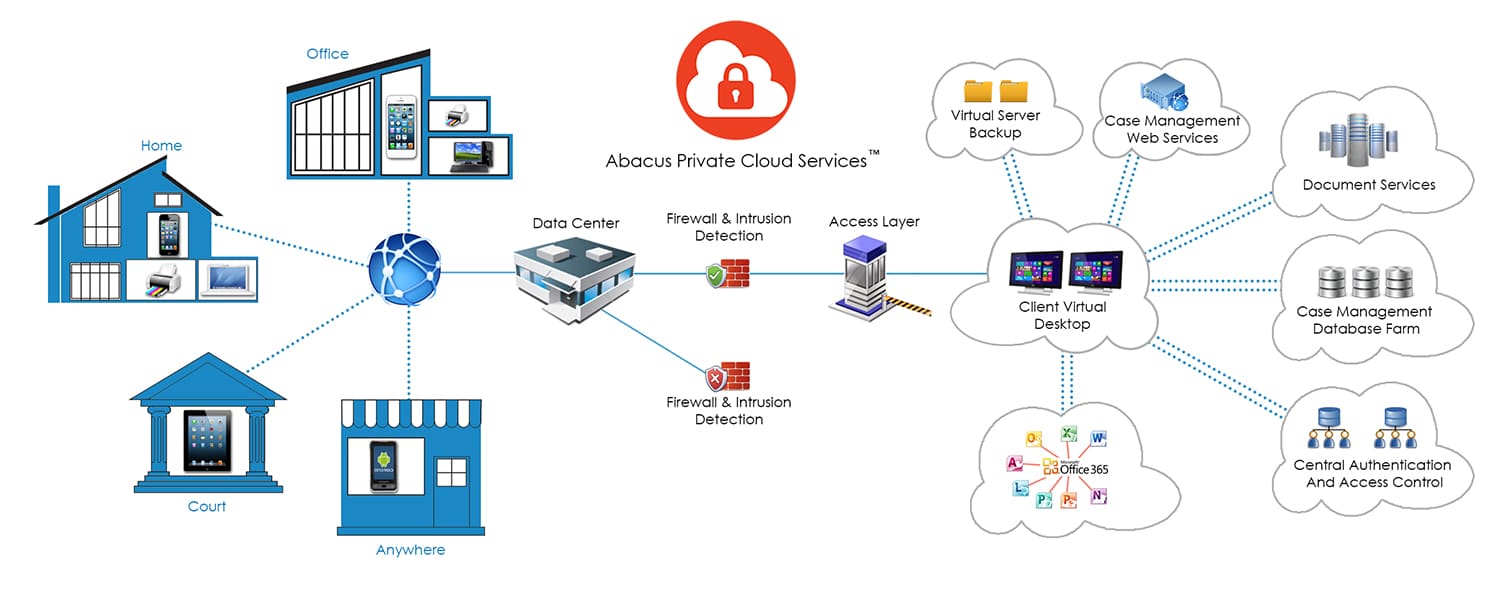It is the nature of an abacus to shift — beads making time, marking off distance and space. An experienced abacist knows the score. Still, you’ve gotta have the stones to make the big moves. In 2014, it’s time for Abacus to reset the frame with a big move into the virtual space.
You’ll know Abacus, firstly, for its law practice management software, AbacusLaw, which is aging well into its fourth decade, with a recently overhauled UX and UI, and a revamped calendar that works a lot like what you get out of Microsoft Outlook. Then there’s Abacus Billing (a new managed service for delivering pre-bills, bills and collection reports, among other things), Abacus Balance (outsourced bookkeeping services) and Abacus Professional Services (a broad support and concierge program for the network of Abacus products and services).
But wait: there’s more! Over the course of the past year, Abacus has added a new CEO and CTO, and dozens of other staff; that changeover in management was the spur for the development of Abacus’ latest platform: Abacus Private Cloud (hereinafter, APC).
Ins and Outs of the APC Service
APC is a virtual, hosted desktop service for law firms. That means that users connect to their traditional applications via a remote desktop interface, rather than via their local applications directly. From a workflow standpoint, for instance, you click on a link to your virtual desktop, where you then open Outlook, rather than clicking on Outlook directly. That’s just another step; but, it’s a very significant one, for a number of reasons.
For one, it means that you’re no longer purchasing and managing hardware, including servers. APC’s virtual server technology runs Windows Server 2012 R2, which is equivalent to Windows 8.1 Professional; and the APC Total Care Team manages server updates, as well as updates for all of your APC-based applications. (APC offers Office 365 with Exchange Server as part of its base package.) If you have an existing application you’d like to continue to use, just provide your license or service key, or buy the product through APC.) If you’ve got existing data to migrate, APC will do it for you (through Abacus Professional Services).
You can add the AbacusLaw practice management system — though you don’t have to. Despite the fact that APC generates from the Abacus world, APC can run all the software applications a law office needs, including the practice management system of your choice: Clio, MyCase, RocketMatter — something really cool that I don’t even know about.
APC is, in essence, an a la carte service for the virtual delivery of desktop applications; but it also comes standard with a document server and nightly data backup, the latter by Abacus Vault — told you they had a ton of products. APC uses Sophos for scanning viruses and malware. One of the keenest advantages that virtual servers, running behind virtual desktops, proffer is flexibility: You can ramp up or down your needs (number of applications, bandwidth and so on) as business exigencies demand, and on the fly. That’s right in APC’s wheelhouse.
If your eyes glazed over during the above descriptions, perhaps this graphic representation will help:
More Things to Pique Your Interest
There are some other fancy Daniel features of APC that you should know about: The cloud is not actually a cloud (as you understand, right?), and the servers that are virtual to you, but physical to APC, are run off of solid-state hard drives — that means they’re hella fast. You can access APC via any device (well, unless you use my cellphone). Also, you can print to a local device, and scan to the remote desktop. APC runs at 5 9’s uptime — that means it’s pretty much always available.
Most lawyers still think of any level of purported discretion attached to the cloud in the Hall & Oates sense, rather than the Tina Turner sense. APC is attempting to change that perception. The data you input into APC remains yours, and you have full read/write access at all times; if you need a file locally, simply copy and paste from APC to your local desktop.
APC places a premium on system security, and all of its data servers are located in the continental United States. (The main data center is in San Diego and a redundant data center stands in Houston.) Every APC client has a specific IP address, which means that specific system resources are dedicated to each firm. A baseline level of customer support is included with each subscription and an emergency line is available with a one-hour callback policy.
APC is a subscription service, starting at $165 per month. Volume discounts are available. If you want more information, Abacus features a robust FAQ section at its website.
The concept of a virtual desktop is not new, even for the legal community. But you’ll be hard-pressed to find a similarly comprehensive system backed by a company with the long-standing reputation of Abacus, which has made a thoughtful foray into this space.
When you’re done thinking about the cloud, go get Brad Paisley’s new album, “Moonshine in the Trunk.” Look up “country party album” in the encyclopedia, and that’s where you’ll find it.
Jared Correia is CEO of Red Cave Law Firm Consulting, which offers subscription-based law firm business management consulting and technology services for solo and small law firms. Red Cave also works with legal institutions and legal-facing corporations to develop programming and content. A former practicing attorney, Jared is a popular presenter and regular contributor to legal publications (including his “Managing” column for Attorney at Work). He is author of the ABA book “Twitter in One Hour for Lawyers,” hosts the Legal Toolkit podcast, and teaches for Concord Law School and Suffolk University Law School. He loves James Taylor, but respects Ron Swanson.
Illustration ©iStock.com.

















